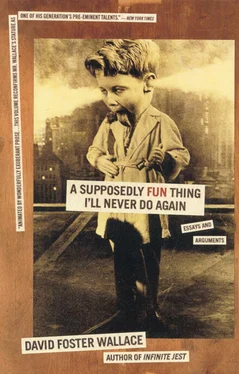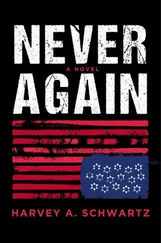And, more to the original point, if television can invite Joe Briefcase into itself via in-gags and irony, it can ease that painful tension between Joe’s need to transcend the crowd and his inescapable status as Audience-member. For to the extent that TV can flatter Joe about “seeing through” the pretentiousness and hypocrisy of outdated values, it can induce in him precisely the feeling of canny superiority it’s taught him to crave, and can keep him dependent on the cynical TV-watching that alone affords this feeling.
And to the extent that it can train viewers to laugh at characters’ unending put-downs of one another, to view ridicule as both the mode of social intercourse and the ultimate art-form, television can reinforce its own queer ontology of appearance: the most frightening prospect, for the well-conditioned viewer, becomes leaving oneself open to others’ ridicule by betraying passé expressions of value, emotion, or vulnerability. Other people become judges; the crime is naïveté. The well-trained viewer becomes even more allergic to people. Lonelier. Joe B.’s exhaustive TV-training in how to worry about how he might come across, seem to watching eyes, makes genuine human encounters even scarier. But televisual irony has the solution: further viewing begins to seem almost like required research, lessons in the blank, bored, too-wise expression that Joe must learn how to wear for tomorrow’s excruciating ride on the brightly lit subway, where crowds of blank, bored-looking people have little to look at but each other.
What does TV’s institutionalization of hip irony have to do with U.S. fiction? Well, for one thing, American literary fiction tends to be about U.S. culture and the people who inhabit it. Culture-wise, shall I spend much of your time pointing out the degree to which televisual values influence the contemporary mood of jaded weltschmerz, self-mocking materialism, blank indifference, and the delusion that cynicism and naïveté are mutually exclusive? Can we deny connections between an unprecedentedly powerful consensual medium that suggests no real difference between image and substance, on one hand, and stuff like the rise of Teflon presidencies, the establishment of nationwide tanning and liposuction industries, the popularity of “Vogueing” to a cynical synthesized command to “Strike a Pose”? Or, in contemporary art, that televisual disdain for “hypocritical” retrovalues like originality, depth, and integrity has no truck with those recombinant “appropriation” styles of art and architecture in which “past becomes pastiche,” or with the repetitive solmizations of a Glass or a Reich, or with the self-conscious catatonia of a platoon of Raymond Carver wannabes?
In fact, the numb blank bored demeanor — what one friend calls the “girl-who’s-dancing-with-you-but-would-obviously-rather-be-dancing-with-somebody-else” expression — that has become my generation’s version of cool is all about TV. “Television,” after all, literally means “seeing far”; and our six hours daily not only helps us feel up-close and personal at like the Pan-Am Games or Operation Desert Shield but also, inversely, trains us to relate to real live personal up-close stuff the same way we relate to the distant and exotic, as if separated from us by physics and glass, extant only as performance, awaiting our cool review. Indifference is actually just the ’90s’ version of frugality for U.S. young people: wooed several gorgeous hours a day for nothing but our attention, we regard that attention as our chief commodity, our social capital, and we are loath to fritter it. In the same regard, see that in 1990, flatness, numbness, and cynicism in one’s demeanor are clear ways to transmit the televisual attitude of stand-out-transcendence — flatness and numbness transcend sentimentality, and cynicism announces that one knows the score, was last naïve about something at maybe like age four.
Whether or not 1990’s youth culture seems as grim to you as it does to me, surely we can agree that the culture’s TV-defined pop ethic has pulled a marvelous touché on the postmodern aesthetic that originally sought to co-opt and redeem the pop. Television has pulled the old dynamic of reference and redemption inside-out: it is now television that takes elements of the postmodern —the involution, the absurdity, the sardonic fatigue, the iconoclasm and rebellion — and bends them to the ends of spectation and consumption. This has been going on for a while. As early as ’84, critics of capitalism were warning that “What began as a mood of the avant-garde has surged into mass culture.” 28
But postmodernism didn’t just all of a sudden “surge” into television in 1984. Nor have the vectors of influence between the postmodern and the televisual been one-way. The chief connection between today’s television and today’s fiction is historical. The two share roots. For postmodern fiction — authored almost exclusively by young white overeducated males — clearly evolved as an intellectual expression of the “rebellious youth culture” of the ’60s and ’70s. And since the whole gestalt of youthful U.S. rebellion was made possible by a national medium that erased communicative boundaries between regions and replaced a society segmented by location and ethnicity with what rock music critics have called “a national self-consciousness stratified by generation,” 29the phenomenon of TV had as much to do with postmodernism’s rebellious irony as it did with Peaceniks’ protest rallies.
In fact, by offering young, overeducated fiction writers a comprehensive view of how hypocritically the U.S.A. saw itself circa 1960, early television helped legitimize absurdism and irony as not just literary devices but sensible responses to a ridiculous world. For irony — exploiting gaps between what’s said and what’s meant, between how things try to appear and how they really are — is the time-honored way artists seek to illuminate and explode hypocrisy. And the television of lone-gunman westerns, paternalistic sitcoms, and jut-jawed law enforcement circa 1960 celebrated what by then was a deeply hypocritical American self-image. Miller describes nicely how the 1960s sitcom, like the westerns that preceded them,
negated the increasing powerlessness of white-collar males with images of paternal strength and manly individualism. Yet by the time these sit-coms were produced, the world of small business [whose virtues were the Hugh Beaumontish ones of “self- possession, probity, and sound judgment”] had been… superseded by what C. Wright Mills called “the managerial demi-urge,” and the virtues personified by… Dad were in fact passé. 30
In other words, early U.S. TV was a hypocritical apologist for values whose reality had become attenuated in a period of corporate ascendancy, bureaucratic entrenchment, foreign adventurism, racial conflict, secret bombing, assassination, wiretaps, etc. It’s not one bit accidental that postmodern fiction aimed its ironic crosshairs at the banal, the naïve, the sentimental and simplistic and conservative, for these qualities were just what ’60s TV seemed to celebrate as distinctively American.
And the rebellious irony in the best postmodern fiction wasn’t just credible as art; it seemed downright socially useful in its capacity for what counterculture critics called “a critical negation that would make it self-evident to everyone that the world is not as it seems.” 31Kesey’s black parody of asylums suggested that our arbiters of sanity were often crazier than their patients; Pynchon reoriented our view of paranoia from deviant psychic fringe to central thread in the corporo-bureaucratic weave; DeLillo exposed image, signal, data and tech as agents of spiritual chaos and not social order. Burroughs’s icky explorations of American narcosis exploded hypocrisy; Gaddis’s exposure of abstract capital as deforming exploded hypocrisy; Coover’s repulsive political farces exploded hypocrisy.
Читать дальше












